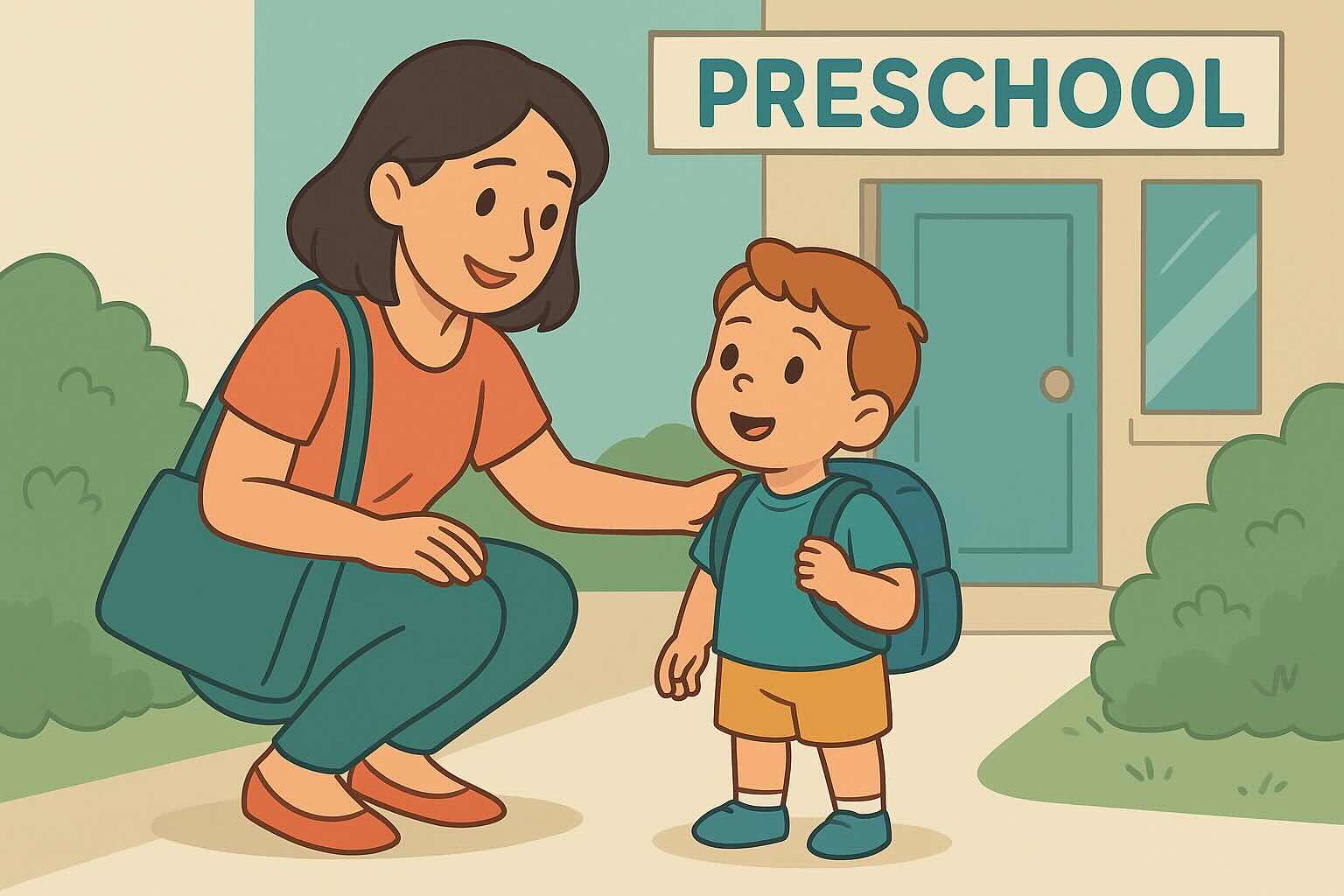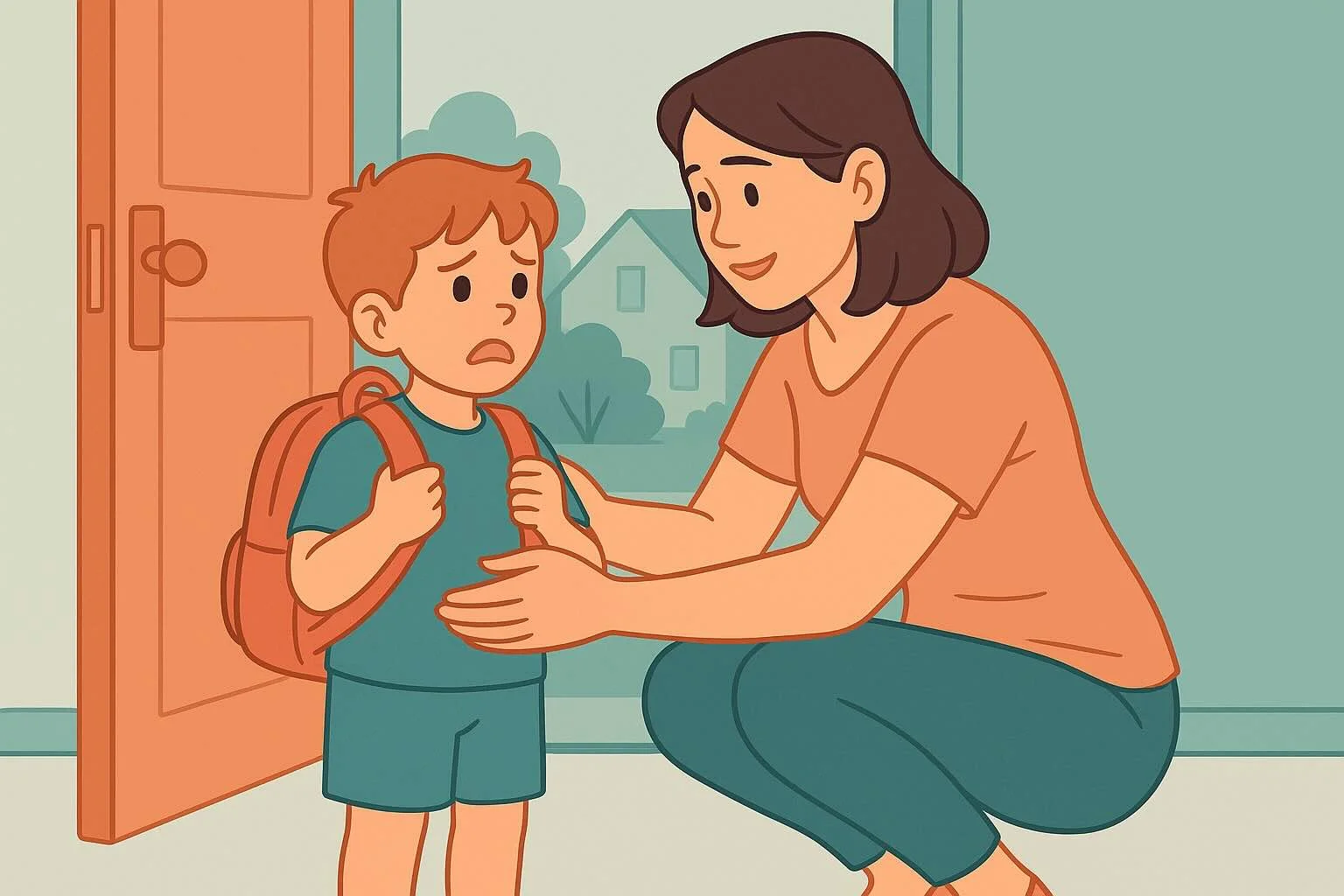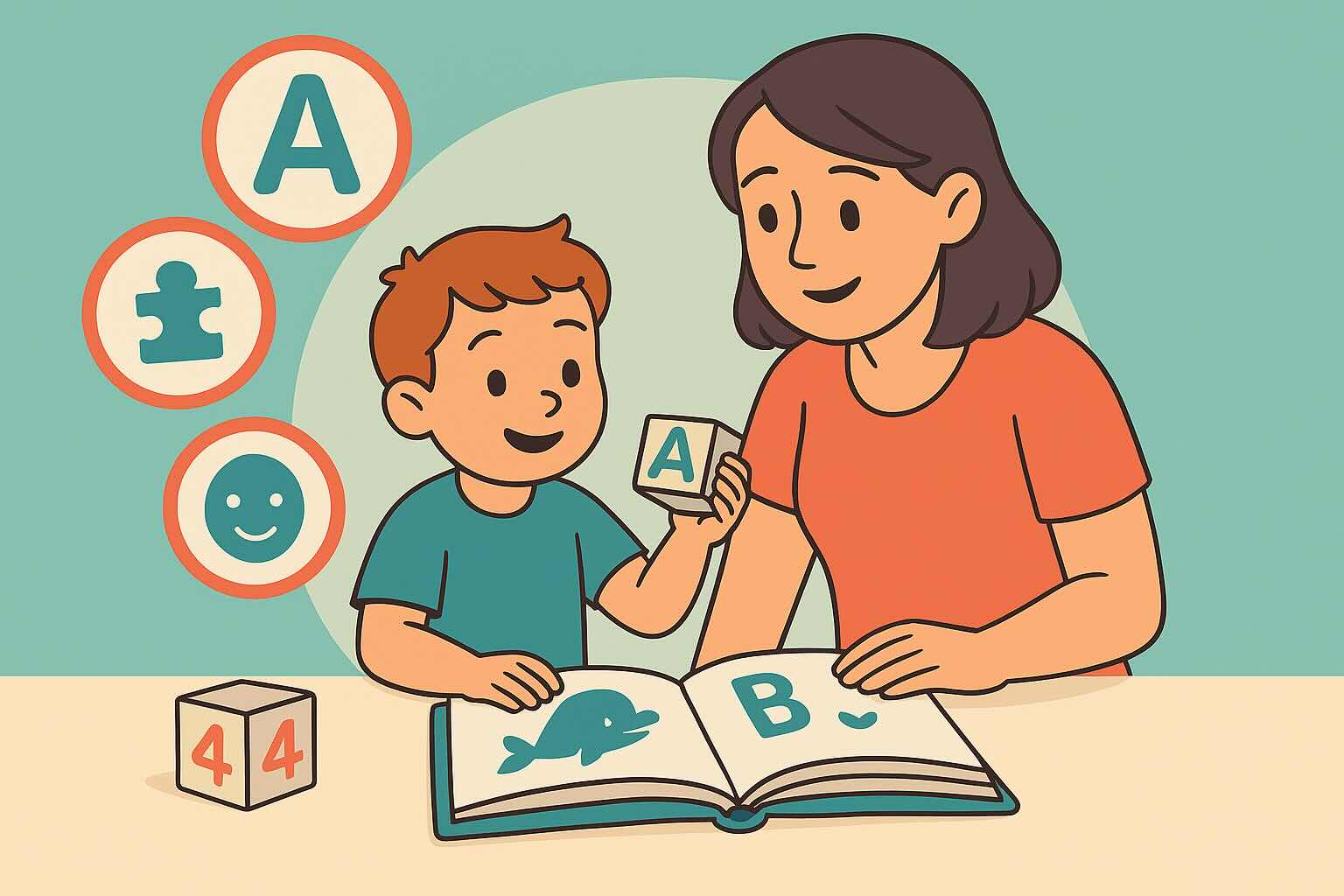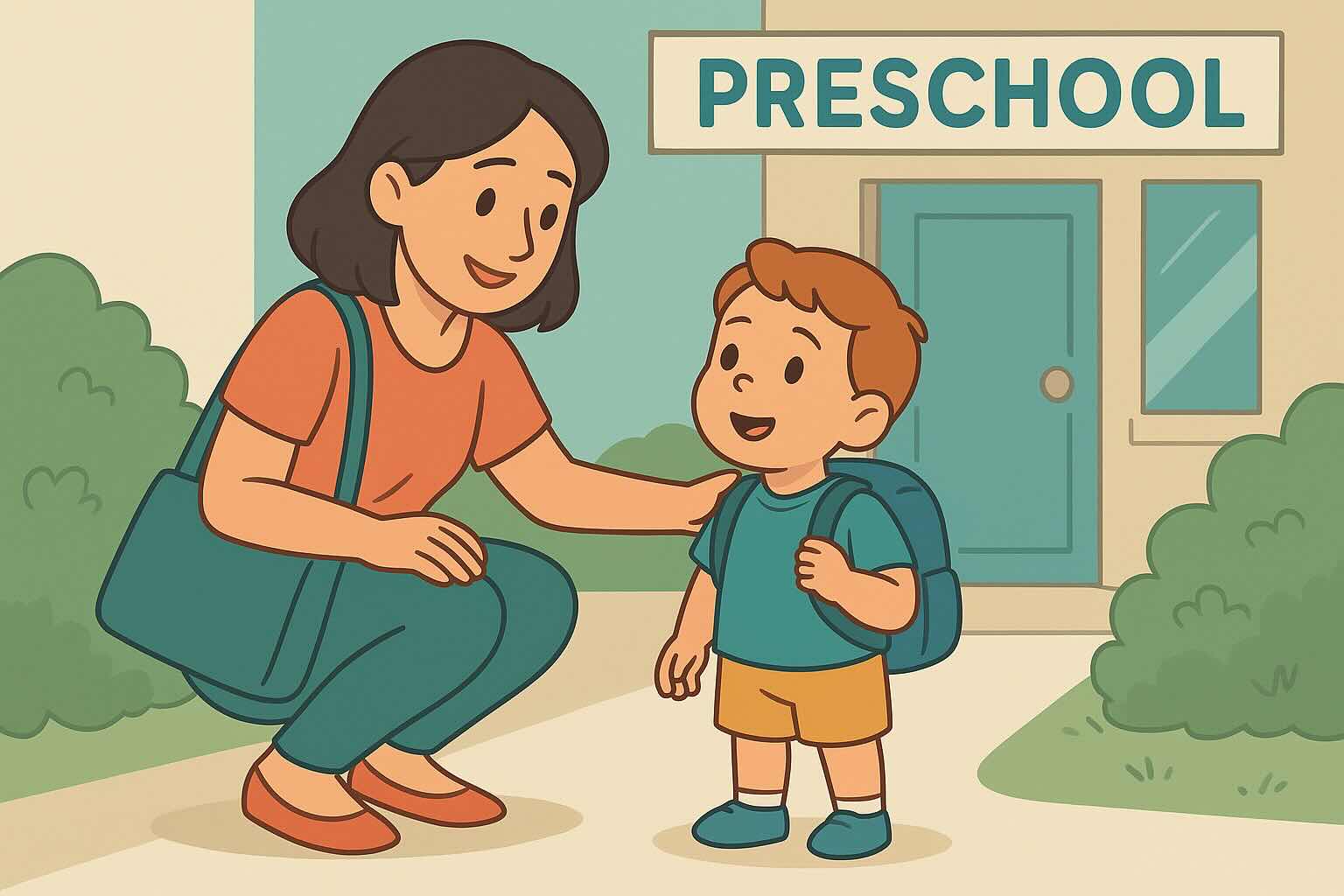Preparing Your 5-Year-Old for Kindergarten: Complete Readiness Guide


Preparing your 5-year-old for kindergarten represents one of the most significant transitions in your child's educational journey. Research shows that children who enter kindergarten with strong social-emotional skills, basic academic readiness, and confidence in their ability to learn demonstrate better academic outcomes and peer relationships throughout elementary school.
At 5, your child stands at the bridge between the play-based learning of early childhood and the more formal academic expectations of elementary school. This transition requires careful preparation across multiple developmental domains—not just academic skills, but also emotional regulation, social competence, and independence abilities that support success in a structured classroom environment.
This comprehensive guide provides evidence-based strategies to prepare your 5-year-old for kindergarten success. You'll discover how to build academic readiness without pressure, develop essential social skills, and create emotional confidence for this major milestone.
For related preparation strategies, explore our guides on starting kindergarten at 5, preparing 6-year-olds for school, managing routine changes, and building cooperation skills.
What You'll Learn in This Guide
- Kindergarten Readiness Assessment - Evaluating your child's development across all essential domains
- Academic Preparation Strategies - Building literacy and numeracy skills through engaging activities
- Social-Emotional Development - Preparing for group learning and peer relationships
- Independence and Self-Advocacy - Essential life skills for classroom success
- 10-Week Preparation Timeline - Structured approach with specific milestones and activities
- Managing Transition Anxiety - Supporting both child and family through this major change
- Partnership with Schools - Building effective relationships with teachers and staff
Estimated reading time: 15 minutes
Understanding Your 5-Year-Old's Developmental Stage
The Unique Position of Five-Year-Olds
5-year-olds occupy a fascinating developmental space where childhood wonder meets emerging academic capability. They retain the creativity, curiosity, and playfulness of early childhood while developing the cognitive skills, attention span, and social awareness needed for formal education.
Cognitive advances that support kindergarten learning:
- Enhanced memory and processing allows retention of complex information and multi-step instructions
- Improved attention span enables participation in 20-30 minute structured learning activities
- Logical thinking development supports understanding of rules, sequences, and cause-and-effect relationships
- Abstract thinking emergence allows comprehension of concepts like time, quantity, and symbolic representation
- Metacognitive awareness helps them begin to understand their own learning processes and needs
Social-emotional development in transition:
- Peer relationships become increasingly important and complex
- Rule understanding develops alongside desire for fairness and justice
- Emotional vocabulary expands while regulation skills continue developing
- Independence motivation grows alongside continued need for adult support and guidance
- Identity formation includes academic self-concept and learning confidence
Individual Differences in Kindergarten Readiness
Early bloomers may demonstrate advanced academic skills but still need support for emotional regulation and social dynamics.
Steady developers typically show balanced growth across domains and adapt well to kindergarten expectations with appropriate preparation.
Late bloomers may need additional time or support in specific areas but often catch up quickly once they adjust to school routines.
Highly sensitive children may have strong academic abilities but need extra preparation for the sensory and social demands of classroom environments.
Recognizing your child's individual profile helps you prepare appropriately and advocate effectively for their needs in the school setting.
Comprehensive Kindergarten Readiness Assessment
Academic Readiness Domains
Pre-literacy skills assessment:
- Name recognition and writing (first name clearly, beginning attempts at last name)
- Letter identification (recognizing most uppercase and some lowercase letters)
- Phonics awareness (identifying beginning sounds, simple rhyming, letter-sound correspondence)
- Book concepts (understanding that print carries meaning, following left-to-right progression)
- Fine motor skills (holding pencil correctly, drawing basic shapes, cutting with scissors)
Pre-numeracy skills evaluation:
- Number recognition (identifying numbers 1-20, understanding their meaning)
- Counting skills (counting objects to 10 with one-to-one correspondence)
- Basic math concepts (more/less, bigger/smaller, simple addition and subtraction concepts)
- Shape and pattern recognition (identifying basic shapes, creating and extending simple patterns)
- Measurement understanding (comparing length, height, weight in everyday contexts)
Assessment strategies:
- Observe your child during natural play and learning activities rather than formal testing
- Focus on enthusiasm and engagement rather than perfect skill mastery
- Document progress over time rather than single-point assessments
- Consider consulting with preschool teachers or early childhood specialists for comprehensive evaluation
- Remember that kindergarten programs will build on your child's current abilities rather than expecting mastery
Social-Emotional Readiness Evaluation
Emotional regulation abilities:
- Managing disappointment when things don't go as expected
- Using words to express frustration, anger, or sadness rather than physical actions
- Calming down within 15-20 minutes when upset with minimal adult support
- Showing resilience when facing new challenges or temporary setbacks
- Asking for help when feeling overwhelmed rather than shutting down or acting out
Social interaction skills:
- Playing cooperatively with groups of 3-4 children for extended periods
- Sharing materials, space, and adult attention willingly
- Resolving simple conflicts with peers using words and compromise
- Showing empathy and kindness when others are hurt or upset
- Following group rules and expectations even when adults aren't directly supervising
Attention and self-regulation:
- Sitting and focusing for 20-30 minutes during structured activities
- Following multi-step instructions without constant reminders
- Transitioning between activities smoothly with appropriate preparation
- Completing tasks even when they become challenging or less interesting
- Working independently while still being part of a group environment
Independence and Life Skills
Self-care independence:
- Complete bathroom routine including privacy, cleanliness, and clothing management
- Managing lunch opening, eating, and cleanup within appropriate time limits
- Dressing and undressing for weather changes and physical education activities
- Organizing personal belongings in cubbies, desks, and backpacks
- Following health and safety routines like handwashing and covering coughs
Communication and self-advocacy:
- Expressing needs clearly to teachers and other adults
- Asking for help with specific problems rather than general distress
- Communicating with peers to resolve conflicts or organize play
- Following verbal instructions even when given to a group rather than individually
- Participating in group discussions and sharing ideas appropriately
Academic Preparation Through Engaging Activities
Building Pre-Literacy Skills Naturally
Kindergarten success depends more on enthusiasm for reading and basic print awareness than on actual reading ability. Focus on creating positive associations with books and building foundation skills that support formal reading instruction.
Letter and sound awareness activities:
- Letter hunts in environmental print during daily errands and outings
- Name activities: tracing, writing, finding letters in their name in other words
- Alphabet books and songs that connect letters with sounds and familiar objects
- Magnetic letters for forming words and exploring letter combinations
- Rhyming games and silly word play that develop phonological awareness
Story comprehension and vocabulary building:
- Daily reading together with discussion about characters, plot, and predictions
- Storytelling where your child creates and shares their own stories
- Acting out favorite stories or books with props and costumes
- Library visits where your child chooses books based on their interests
- Connecting book experiences to real-life experiences and activities
Fine motor skill development for writing:
- Drawing and art activities that encourage creativity while building hand strength
- Cutting activities with scissors that progress from simple lines to complex shapes
- Playdough and clay manipulation that strengthens hand muscles and coordination
- Tracing activities using sandpaper letters, finger painting, or textured surfaces
- Building activities with small manipulatives that develop precision and control
Developing Mathematical Thinking
Mathematical concepts in kindergarten focus on understanding quantities, relationships, and patterns rather than memorizing facts. Build number sense through hands-on exploration and real-world application.
Number sense and counting:
- Counting everyday objects during routines: toys during cleanup, steps while walking, food items during cooking
- Number recognition games using playing cards, dice, or number line activities
- Quantity comparison activities: which group has more? How many more do we need?
- Simple addition and subtraction using concrete objects rather than abstract worksheets
- Creating number books where your child draws pictures to represent different quantities
Pattern and spatial reasoning:
- Pattern activities using everyday objects: blocks, toys, clothing, or food items
- Shape exploration through building, drawing, and finding shapes in the environment
- Measurement activities during cooking, building, or comparing objects
- Calendar activities that build understanding of time sequences and number patterns
- Sorting and classification games that develop logical thinking and category understanding
Mathematical language development:
- Using mathematical vocabulary naturally during daily activities: first/last, before/after, more/less
- Asking questions that promote mathematical thinking: "How many do you think?" "What comes next?"
- Connecting math concepts to your child's interests: measuring ingredients in favorite recipes, counting characters in favorite books
- Playing simple board games that involve counting, strategy, and following rules
- Encouraging mathematical problem-solving in everyday situations
Social-Emotional Development for Classroom Success
Building Cooperation and Group Skills
Kindergarten requires children to function successfully as part of a larger group while maintaining their individual identity and needs. This balance requires explicit teaching and practice before school begins.
Group participation skills:
- Following directions given to the entire group rather than individual instruction
- Waiting appropriately for turns in activities, conversations, and teacher attention
- Contributing to group activities while respecting others' contributions and ideas
- Adapting to group decisions even when they differ from personal preferences
- Understanding and following classroom rules that may differ from home expectations
Conflict resolution and problem-solving:
- Using words to express disagreement or frustration with peers
- Attempting independent problem-solving before seeking adult assistance
- Accepting compromises and alternative solutions when first choice isn't available
- Showing empathy when others are hurt or upset by their actions
- Learning from social mistakes and making different choices in similar future situations
Building group skills at home:
- Regular group playdates where your child practices sharing, cooperation, and conflict resolution
- Family activities that require teamwork and shared decision-making
- Board games and group activities with clear rules and turn-taking expectations
- Discussions about social situations and brainstorming solutions to common peer conflicts
- Community activities like sports teams, clubs, or group classes that build group participation skills
Emotional Regulation for Academic Environments
Kindergarten classrooms can be emotionally challenging due to academic expectations, social complexity, and reduced individual attention. Building emotional regulation skills prepares your child to handle these challenges successfully.
Advanced emotional regulation abilities:
- Recognizing early warning signs of emotional overwhelm before reaching crisis point
- Using multiple coping strategies independently depending on the situation and available resources
- Expressing complex emotions with sophisticated vocabulary and appropriate intensity
- Accepting support from teachers and other adults while maintaining emotional independence
- Recovering from setbacks, disappointments, or mistakes without prolonged disruption to learning
Coping strategies for classroom environments:
- Self-calming techniques that work in group settings: quiet breathing, positive self-talk, brief movement
- Problem-solving focus: identifying what went wrong and what could be different next time
- Help-seeking skills: knowing when and how to ask for support from teachers or peers
- Emotional expression that doesn't disrupt others: using art, writing, or quiet discussion
- Resilience building: understanding that mistakes and challenges are part of learning
Emotional skill development activities:
- Regular emotion discussions during daily routines and book reading
- Problem-solving practice during naturally occurring frustrations and challenges
- Modeling your own emotional regulation and discussing your strategies openly
- Creating opportunities for your child to experience appropriate challenges and build confidence through mastery
- Teaching and practicing specific coping strategies during calm moments so they're available during stress
Independence and Self-Advocacy Skills
Advanced Self-Care and Organization
Kindergarten requires greater independence in managing personal needs, belongings, and academic materials. These skills allow your child to focus on learning rather than basic survival needs.
Personal care mastery:
- Complete bathroom routine including privacy management, cleanliness, and appropriate timing
- Dressing and undressing independently for different weather conditions and activities
- Managing personal hygiene including handwashing, nose blowing, and covering coughs appropriately
- Eating lunch independently within time limits while maintaining appropriate social behavior
- Recognizing and communicating physical needs like hunger, thirst, fatigue, or illness
Organization and responsibility:
- Managing school supplies, homework folders, and personal belongings systematically
- Following morning and end-of-day routines with minimal adult supervision
- Caring for school materials and returning borrowed items appropriately
- Organizing workspace and cleaning up materials when activities are completed
- Taking responsibility for completing tasks and remembering important information
Building independence gradually:
- Allow extra time for your child to complete self-care tasks without rushing or rescuing
- Create organizational systems at home that mirror school expectations
- Practice following morning routines independently including breakfast, dressing, and gathering materials
- Encourage problem-solving attempts before offering assistance or solutions
- Celebrate increasing independence while maintaining emotional connection and support
Communication and Self-Advocacy Development
5-year-olds can develop sophisticated self-advocacy skills that serve them well in busy classroom environments where individual attention is limited.
Essential self-advocacy abilities:
- Communicating specific needs clearly: "I need help understanding this math problem" rather than "I don't get it"
- Expressing feelings and concerns appropriately: "I feel worried about reading in front of the class"
- Making requests and asking questions confidently: "May I please have more time to finish this?"
- Reporting problems or conflicts to adults when peer resolution attempts aren't successful
- Asking for clarification when instructions or expectations are unclear
Advanced communication skills:
- Participating in group discussions by listening to others and contributing relevant ideas
- Following conversational rules like taking turns, staying on topic, and building on others' ideas
- Using appropriate voice volume and body language for different situations and environments
- Showing respect for adult authority while maintaining personal voice and preferences
- Communicating effectively with peers about academic work, play activities, and conflict resolution
Building self-advocacy skills:
- Practice different scenarios where your child needs to communicate with unfamiliar adults
- Role-play classroom situations and appropriate ways to ask for help or express needs
- Encourage your child to advocate for themselves in community settings like restaurants, stores, or recreational activities
- Discuss the difference between appropriate self-advocacy and inappropriate demands or complaints
- Celebrate successful self-advocacy attempts even when outcomes aren't perfect
10-Week Kindergarten Preparation Timeline
Weeks 10-8: Assessment and Foundation Building
Comprehensive readiness evaluation:
- Complete thorough assessment of your child's academic, social, emotional, and independence skills
- Identify specific areas that need development and create targeted goals for improvement
- Research your child's assigned school and teacher to understand specific expectations and approaches
- Begin positive conversations about kindergarten without creating pressure or unrealistic expectations
Foundation skill development:
- Start working on any basic independence skills that need strengthening
- Begin incorporating academic readiness activities naturally into daily routines
- Increase opportunities for group social interaction and cooperation practice
- Address any concerning behavioral or developmental issues with appropriate professionals
Weeks 7-5: Intensive Skill Building
Academic readiness focus:
- Intensify pre-literacy activities including letter recognition, phonics awareness, and fine motor development
- Build mathematical thinking through hands-on exploration and real-world application
- Extend attention span gradually through increasingly challenging and engaging activities
- Develop academic enthusiasm and learning confidence through success experiences
Social-emotional development:
- Provide regular opportunities for group play and cooperation skill development
- Teach and practice emotional regulation strategies during naturally occurring challenges
- Build empathy and perspective-taking through book discussions and real-life situations
- Practice following group rules and expectations in various settings
Weeks 4-2: Integration and School Preparation
Skill integration activities:
- Combine academic, social, and independence skills in structured activities that mirror school expectations
- Practice complete daily routines including morning preparation, sustained work time, and evening reflection
- Visit the school building, meet the teacher, and become familiar with classroom environment if possible
- Address any anxiety or concerns your child expresses about starting kindergarten
Environmental and logistical preparation:
- Complete supply shopping and organization with your child's participation and excitement
- Practice transportation routines including timing, route, and arrival procedures
- Establish communication systems with school staff and understand classroom policies and procedures
- Plan meaningful first-day traditions that honor this important developmental milestone
Weeks 1-0: Final Preparation and Launch
Confidence building and final readiness:
- Focus on celebrating your child's growth and readiness rather than addressing remaining deficits
- Maintain positive anticipation and excitement while acknowledging that some nervousness is normal
- Complete any final logistical preparations including medical forms, emergency contacts, and communication systems
- Trust your child's ability to adapt and learn in their new environment with appropriate support
Supporting successful adjustment:
- Implement consistent routines that support your child's success in their new academic environment
- Maintain regular communication with teachers about your child's adjustment and any concerns
- Monitor your child's emotional and physical wellbeing during the first months of school
- Celebrate successes and provide extra support during challenging aspects of the transition
Managing Transition Anxiety for Child and Family
Understanding Kindergarten Anxiety
Anxiety about starting kindergarten is completely normal for both children and parents. This represents a major life transition that involves new environments, relationships, expectations, and daily routines.
Common child concerns about kindergarten:
- Separation from parents for longer periods than previously experienced
- Performance anxiety about meeting academic and behavioral expectations
- Social worries about making friends and fitting in with peer groups
- Fear of new adults in positions of authority and unfamiliar classroom rules
- Concerns about practical matters like finding the bathroom, opening lunch containers, or asking for help
Supporting anxious children:
- Validate feelings as normal and understandable while maintaining confidence in their ability to succeed
- Provide concrete, specific information about what kindergarten will actually be like
- Practice coping strategies that your child can use independently when feeling worried or overwhelmed
- Focus on exciting aspects of kindergarten while acknowledging that some nervousness shows they understand this is important
- Connect with school staff to understand their approaches to supporting anxious children during transition
Family System Preparation
Preparing siblings for family changes:
- Include siblings in kindergarten preparation activities when appropriate and discuss how family routines will change
- Address any concerns older or younger siblings have about attention shifts or schedule modifications
- Maintain special individual time with siblings who may feel displaced by kindergarten preparation focus
- Help siblings understand their important role in supporting the kindergartener's success
Parental emotional preparation:
- Acknowledge your own feelings about your child starting kindergarten including pride, anxiety, sadness, or excitement
- Seek support from other parents who have navigated this transition successfully
- Focus on the growth opportunities kindergarten provides for your child's development and independence
- Prepare for practical changes in your daily routine and family schedule
Extended family and caregiver coordination:
- Share kindergarten preparation strategies with grandparents, babysitters, and other regular caregivers to ensure consistency
- Communicate about your child's kindergarten experience and how extended family can support adjustment
- Include extended family members in celebrating this important developmental milestone appropriately
- Ensure that all caregivers understand and support school expectations and routines
Partnership with Schools and Teachers
Building Effective Communication
Strong home-school partnerships significantly impact children's academic success and social-emotional adjustment. Establish positive relationships with school staff from the beginning.
Essential information to share with teachers:
- Your child's individual strengths, interests, and effective motivation strategies
- Areas of concern or challenge and approaches that have been successful at home
- Important family information that affects your child's school experience
- Your goals and hopes for your child's kindergarten experience
- Any special needs, accommodations, or considerations that support your child's success
Questions to ask teachers and school staff:
- "What does a typical day look like in your kindergarten classroom?"
- "How do you support children who are struggling with specific academic or social challenges?"
- "What can we do at home to support what you're working on in the classroom?"
- "How and when will you communicate about my child's progress and any concerns?"
- "What are your expectations for parent involvement and support?"
Supporting Learning at Home
Creating a home environment that supports school success:
- Establish consistent daily routines that reinforce school expectations for organization and responsibility
- Provide a quiet, well-organized space for homework and school-related activities
- Show genuine interest in your child's school experiences, learning, and friendships
- Support teacher strategies and expectations with consistent approaches at home
- Create opportunities for your child to practice school skills in home contexts
Avoiding common home-school conflicts:
- Support teacher authority and classroom rules even when they differ from home expectations
- Avoid rescuing your child from appropriate academic or social challenges
- Address concerns directly with teachers rather than discussing them extensively with your child
- Trust teacher expertise while advocating appropriately for your child's individual needs
- Focus on your child's growth and learning rather than comparing to other children's experiences
Your Final 4-Week Kindergarten Success Plan
Week 1: Comprehensive Preparation Review
- Complete final assessment of your child's readiness across all developmental domains
- Address any remaining concerns with teachers, school staff, or healthcare providers
- Focus on building confidence and excitement rather than addressing remaining skill deficits
- Implement full kindergarten schedule including wake-up times, structured activities, and bedtime routines
Week 2: School Environment and Relationship Building
- Visit kindergarten classroom and meet teacher during scheduled orientation activities
- Practice complete morning routine including transportation and arrival at school
- Discuss your child's individual needs, strengths, and effective strategies with school staff
- Complete any remaining paperwork, supply organization, and logistical preparations
Week 3: Final Skills Integration and Confidence Building
- Practice integrated academic, social, and independence skills through structured activities
- Address any remaining anxiety or concerns your child expresses about starting kindergarten
- Plan meaningful first-day traditions or celebrations that honor this developmental milestone
- Prepare strategies for supporting your child's adjustment during the first weeks of school
Week 4: Launch and Early Support
- Focus on positive anticipation and confidence in your child's ability to succeed
- Maintain realistic expectations for adjustment timeline and potential challenges
- Begin kindergarten with open communication with teachers and willingness to problem-solve collaboratively
- Trust your child's resilience while providing appropriate emotional and practical support
Ongoing: Monitoring and Support
- Maintain regular communication with teachers about your child's academic and social progress
- Monitor your child's adjustment and wellbeing while allowing natural adaptation time
- Celebrate successes and provide additional support for challenging aspects of kindergarten
- Continue building your child's confidence and love of learning through supportive home environment
Key Takeaways: Preparing Your 5-Year-Old for Kindergarten Success
- ✅ Social-emotional skills predict success more strongly than early academic achievement
- ✅ Individual readiness varies significantly - focus on your child's unique development and needs
- ✅ Academic enthusiasm matters more than perfect skill mastery before kindergarten begins
- ✅ Independence and self-advocacy are crucial for success in busy classroom environments
- ✅ Adjustment typically takes 4-8 weeks with continued growth throughout the first year
- ✅ Home-school partnership supports success through consistent communication and shared goals
- ✅ Emotional regulation requires explicit teaching and practice in supportive environments
- ✅ Preparation should be gradual and positive rather than intensive or pressure-filled
- ✅ Professional support is available for children who need additional time or different approaches
- ✅ Kindergarten readiness includes family preparation for this major life transition
Remember: Kindergarten preparation is about building your child's confidence, curiosity, and capacity for learning in a group environment. Trust their individual development while providing the comprehensive preparation they need to thrive academically, socially, and emotionally in their new school community.
This article is based on early childhood development research and educational psychology. Individual experiences vary based on child temperament, family circumstances, and school environment. Consult with teachers, school counselors, or your pediatrician if you have concerns about your child's kindergarten readiness or adjustment.
24/7 AI Parenting Assistant
Get instant, personalized advice with expert-curated parenting knowledge. Chat with your AI coach anytime, anywhere.

Self-Care for Parents
Daily affirmations, guided meditations, and journaling tools to help you stay centered and emotionally balanced.

Routine Transition Planner
4-week method for implementing routine changes successfully with gradual strategies and resistance management techniques.
Frequently Asked Questions
Need personalized support?
RootWise's AI coach can provide tailored strategies for your specific situation, available 24/7 when you need it most.
Learn More About AI Coaching →



